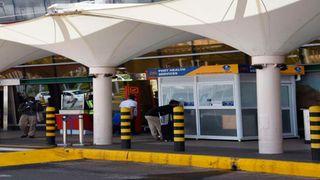
Port Health Services desk at the Jomo Kenyatta International Airport on November 29, 2021.
| Diana Ngila | nation Media GroupNews
Premium
Omicron: World transporters unite to reject travel bans
What you need to know:
- Lobbies said the industry rejects fresh travel restrictions including those that limit the flow of people and goods.
- Transport players caution that travel bans are putting the jobs of workers in the logistics sector at risk.
Global land, sea and air transport lobbies are laying into world leaders for imposing travel bans in the wake of the new Omicron Covid-19 variant.
The transporters, who include shipping operators, air freighters and cross border hauliers, say the “knee-jerk” reactions to the new variant risk killing an already ailing global supply chain.
In a joint statement that could boost Africa’s argument against restrictions, the lobbies which represent commercial airliners, shippers, international road transporters and transport workers said the industry rejects fresh travel restrictions including those that limit the flow of people and goods.
The lobbies - including International Air Transport Association (IATA), International Chamber of Shipping and the International Road Transport Union – said the bans “will do nothing to prevent this while inflicting serious harm to still recovering global supply chains and local economies.”
Representing about $20 trillion of the world’s trade share, the transport players cautioned that travel bans are putting the jobs of workers in the logistics sector at risk, while also damaging local economies.
Flight bans
Since South Africa first announced a new variant of SARS-COV-2, the virus that causes Covid-19, at least five dozens of countries across the world have imposed travel restrictions, including the controversial blanket ban on all of South Africa’s neighbours by the UK, US and Canada.
“Now is the time for heads of state to listen to industry leaders and workers, by taking decisive and coordinated action together to ease strain on the supply chain, and support an exhausted global transport workforce during the busy holiday season,” they said.
“Public health officials tell us that we should expect variants to emerge. And by the time they are detected, experience shows that they are already present around the globe,” added Willie Walsh, Director General, IATA, the association of commercial airlines including Kenya Airways and Ethiopian.
Although flight bans have affected air passenger traffic, the lobbies also say it could slow down deliveries by road or sea as countries close borders on foreign arrivals.
Last week, the World Health Organization said Omicron was a variant of concern, but asked countries to do more surveillance and study its infection patterns rather than lock borders.
Free movement
Scientists in places like Germany and the Netherlands have since discovered the same variant in people who had no travel history or contact with those who had come from southern Africa.
South Africa and Botswana have protested “punishment” for revealing the variant. Botswana’s President Mokgweesti Masisi revealed on Wednesday that four samples of the variant in his country were found among foreign diplomats who had just arrived.
“The response by some countries to our detection of the Omicron variant is unfortunate as it appears to have caused unnecessary panic amongst the public across the world. The decision to ban our citizens from travelling to certain countries was hastily made and is not only unfair but is also unjustified,” said President Masisi on Wednesday.
At an event in New York, African Union Commission Chairperson Moussa Faki Mahamat told an audience the travel bans were based on neither logic nor scientific data.
“We have told UN agencies that there is no scientific basis for these travel bans, it has been found that this variant was circulating in Europe before it was identified in South Africa,” Faki said.
The transport lobbies want a guarantee of free movement, priority to vaccinations and adherence to only public health protocols that have worked.





